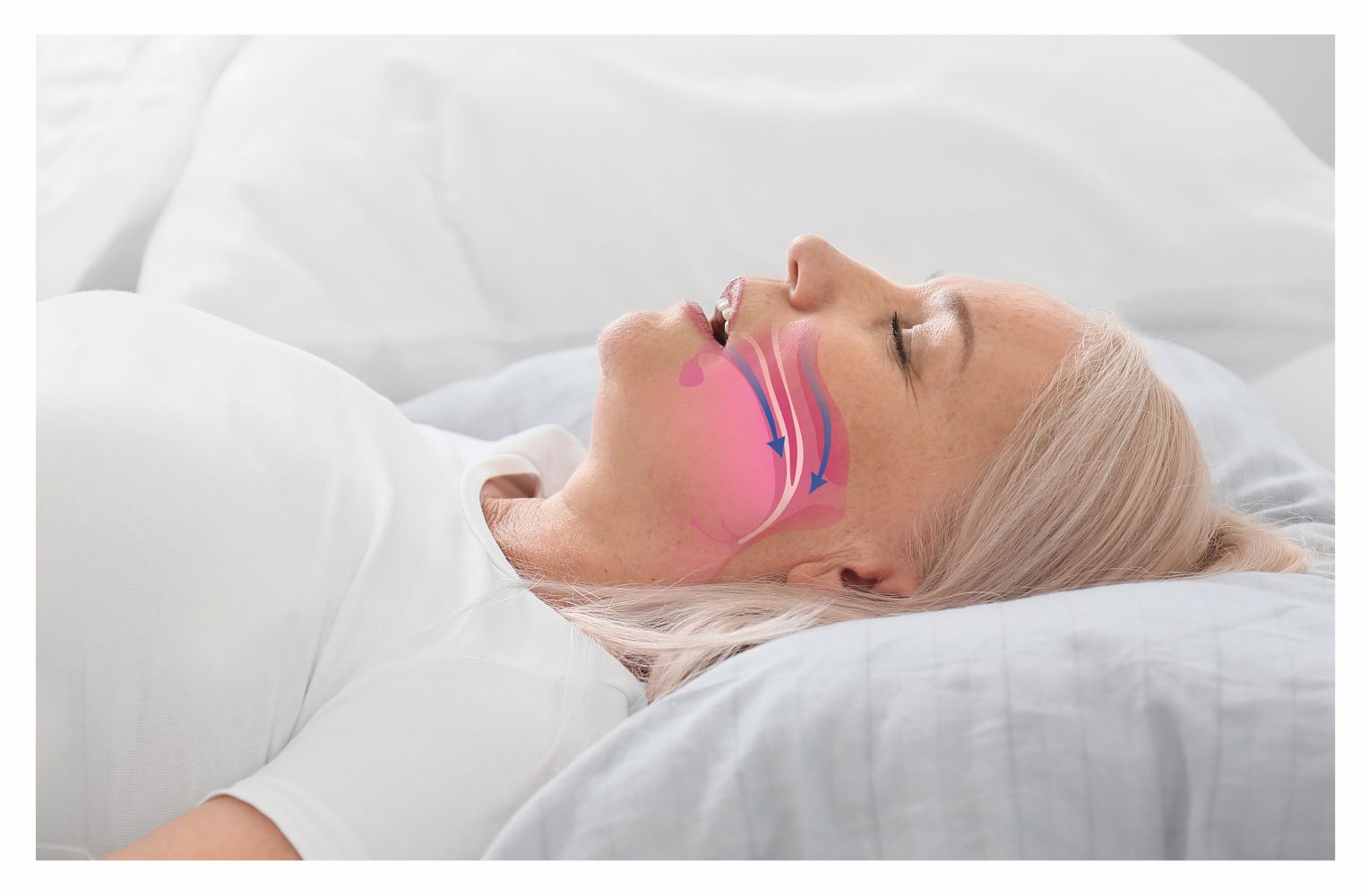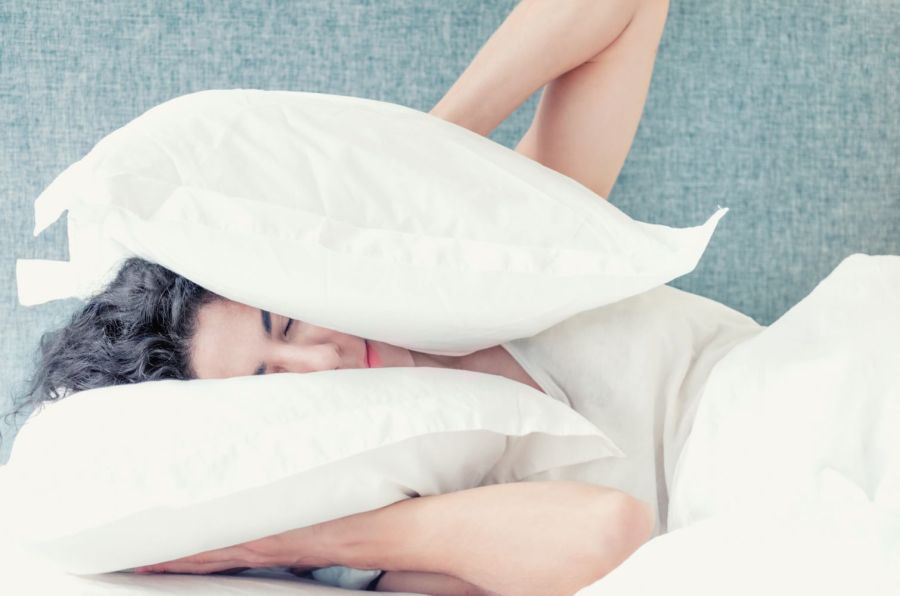Does your snoring (or your partner’s!) keep the whole household awake? If snoring is getting you down, read on for some expert advice on why we snore, plus the best things you can do to stop snoring fast.
Why do we snore?
Snoring is caused by the vibration of weakened pharyngeal muscles and the consequent narrowing of the upper airways. The soft palate and the uvula begin to flutter due to the exchange of air during breathing. ‘People who are overweight or obese are more likely to snore or have obstructive sleep apnoea, which is when your breathing stops and starts while you sleep. The most common type is called obstructive sleep apnoea (OSA),’ says leading snoring specialist, Dr Nathan Holt from Cambridge Laser Clinic. ‘This is largely due to the fact that overweight people have more neck fat, which compresses the upper airway when they lay down, thus making snoring more likely. ‘Extra weight around the middle and chest also exacerbates snoring and sleep apnoea. This is because the fat in these areas pushes the diaphragm and compresses the ribs, effectively shrinking the volume of the lungs.’
Dr Holt mentions that it’s important not to underestimate the effect of snoring on the mental and physical health of the individual and their family. ‘There are different types of snoring: nasal snoring occurs when something is blocking the nasal passages, mouth snoring also occurs when the nasal passages are blocked and causes you to breathe through your mouth when asleep, and tongue snoring is usually identified by inconsistent, high-pitched sounds,’ says Dr Holt.

Snoring is caused by the vibration of weakened pharyngeal muscles and the consequent narrowing of the upper airways.
How to stop snoring: lifestyle changes and treatment options
1. Stay a healthy weight
Obesity is the most significant risk factor in the development of sleep apnoea. If you’re overweight, this can contribute to snoring.
2. Avoid sleeping on your back to stop snoring
Sleeping on your back can exacerbate snoring. Try being on your side instead. If you find yourself rolling onto your back during the night, it might be worth using a wedge pillow to keep you on your side, or putting something into the back of your PJs to make back sleeping uncomfortable.

Drinking alcohol relaxes the tissues and muscles in the upper airways, which can worsen snoring.
3. Reduce or cut out alcohol
There are a few reasons why alcohol can make snoring worse, including the fact that the more alcohol you drink, the more relaxed the tissues and muscles become. Drinking alcohol also dehydrates you and creates a dry mouth and throat, which can make snoring louder.
4. Stop smoking
Needless to say, smoking makes snoring worse because it irritates the membranes in the nose and throat, which can block the airways.
5. Avoid sleeping pills (these can make snoring worse!)
Sleeping pills can sometimes make snoring worse, too, because although they help you sleep, they also relax your throat muscles, ultimately making snoring worse.
6. Try an in-mouth device to stop snoring
Your GP may suggest a mouthguard to bring your tongue forward when you sleep. Designed to stop snoring, mouthguards fall into two categories: mandibular advancement devices (MADs) that fit inside the mouth and push the lower jaw forward to open the airway, and tongue retaining devices (TRDs), which grip the tongue and prevent it falling to the back of the throat. Or you might want to try a vestibular shield, which helps you breathe through your nose when you’re asleep. A vestibular shield or plate is different to a snoring mouthpiece as it prevents breathing through the mouth while you are sleeping. This prevents the soft tissue in the back of the mouth and throat from vibrating to stop snoring.
7. Try an anti-snoring spray
There are sprays you can get to reduce swelling in your nose and reduce or stop snoring. There are a number of different brands of these on the market, such as Nytol Anti-Snoring Throat Spray (£10.50). This contains phosphatidylcholine, which coats the throat muscles and prevents them from moving and vibrating.

Allergies (including hay fever, dust, or pets) can cause you to snore.
8. Address any allergies which could be causing you to snore
Anything that causes an inflamed nose can make breathing harder and snoring worse, so hay fever and allergies to dust or pets can all exacerbate snoring. Make sure your bedroom is clean and keep pets out if you think this might be a problem.
9. Monitor air quality and temperature
There’s no doubt sleep quality is linked to air quality. Studies show a relationship between long-term exposure to traffic and outdoor pollutants and sleep disorders, including obstructive sleep apnoea. Also, many people believe sleeping in a cooler environment reduces snoring. This could be related to the dilation of the upper airway muscles at different temperatures.
10. Consider Somnilase to stop severe snoring
If your snoring is really bad, take a look at new treatment Somnilase (£550 per session). It strengthens the structure of your soft palate and uvula, making it more stable during breathing and giving it greater resistance to airflow at night. The procedure is non-surgical, takes around 15 minutes, utilises laser technology and is virtually pain-free. You can expect to see results as soon as the next day. It’s currently not available on the NHS, but you can find it at a number of medical clinics across the UK.







